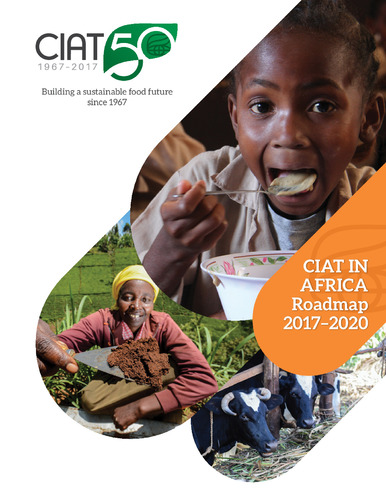CIAT in Africa Roadmap 2017-2020
Our goal is to provide the scientific basis for development investments and policies that promote more productive, profitable agriculture, and healthier diets at no environmental cost. Low-income, smallholder farmers face significant challenges across sub-Saharan Africa (SSA). High population growth is coinciding with migration to the cities as younger populations seek out higher income-earning opportunities. Inadequate infrastructure and few markets for agricultural production in rural areas, for example, are leading to stagnated opportunities for smallholders. More people need diverse, nutritious food. This needs to be affordable and available to low-income, vulnerable people.
Opportunities to accelerate and make agricultural production more efficient exist. We can – and must – harness science and agricultural research for development to drive agricultural growth and contribute to meeting the Sustainable Development Goals (SDGs), continental and national goals as envisaged under the Comprehensive Africa Agriculture Development Programme (CAADP) and other strategic frameworks with which CIAT’s work is aligned.
In the last 50 years, CIAT has worked to improve livelihoods and make healthier, local foods available to more people, while protecting land resources and ecosystems. In doing so, our work in Africa has broadened from commodity-focused interventions to understanding interactions within the wider food system.
This Roadmap outlines four thematic areas that CIAT aims to address in Africa to make agricultural systems more resilient and efficient. These areas apply a sharper focus to specific opportunities and foster a holistic and cross-cutting approach to tackle research and development challenges.
The themes communicate our areas of strength, and outline opportunities for future engagement, to strengthen the impact pathway of our research.
The four thematic areas are: Leveraging markets through improved productivity and competitiveness; Agriculture for improved nutrition and health; Transforming farms and landscapes for sustainability; and Investment planning for resilient agriculture. Each is intended as a growth opportunity and value proposition for CIAT in Africa.
The themes inform our progress within today’s multi-layered research landscape and with our partners, the private sector, NGOs, governments, development partners, and farmers. Our partners have historically been central to our work in the region, and they remain so today. Much of our work is about presenting better solutions and decision-support tools for these partners, so they can make wiser investments in agriculture, prioritizing limited resources for a healthier, wealthier continent for our families today – and for our children to inherit.

